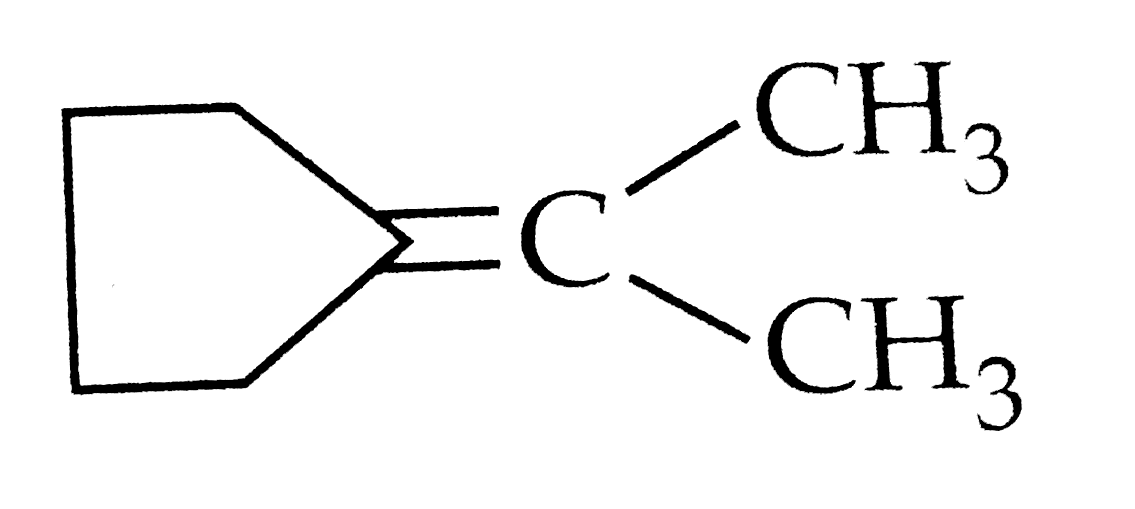Which of the following alkenes on ozonolysis give a mixture of ketones only?
CH3−CH=CH−CH3
CH3−C∣CH3−CH=CH3

CH3−CH=CH2
The correct Answer is:C
To determine which alkenes give a mixture of ketones only upon ozonolysis, we will analyze the ozonolysis process step by step.
1. Understanding Ozonolysis:
Ozonolysis is a reaction where alkenes react with ozone (O3) to form ozonides, which upon reduction (commonly with zinc and water) yield carbonyl compounds (aldehydes or ketones).
2. Identifying the Alkene Structure:
We need to analyze the given alkenes. The key is to identify whether the double bond is terminal or internal:
- Terminal alkenes typically yield aldehydes.
- Internal alkenes can yield ketones.
3. Analyzing Each Alkene:
- Alkene 1: If the alkene is something like CH3-CH=CH2 (propene), ozonolysis will yield CH3CHO (acetaldehyde) and CH3CHO (acetaldehyde), which are aldehydes.
- Alkene 2: If the alkene is CH3-CH=CH-CH3 (butene), ozonolysis will yield CH3COCH3 (acetone) and CH3COCH3 (acetone), which are ketones.
- Alkene 3: If the alkene is CH3-CH=CH2 (propene) again, it will yield aldehydes.
- Alkene 4: If the alkene is CH3-CH=CH-CH3 (butene), it will yield ketones.
4. Conclusion:
The alkenes that yield a mixture of ketones only upon ozonolysis are those that do not have terminal double bonds. Therefore, alkenes like CH3-CH=CH-CH3 yield only ketones.
Final Answer:
The alkenes that give a mixture of ketones only upon ozonolysis are those that are internal alkenes, such as CH3-CH=CH-CH3.
Ozonolysis is a reaction where alkenes react with ozone (O3) to form ozonides, which upon reduction (commonly with zinc and water) yield carbonyl compounds (aldehydes or ketones).
We need to analyze the given alkenes. The key is to identify whether the double bond is terminal or internal:
- Terminal alkenes typically yield aldehydes.
- Internal alkenes can yield ketones.
- Alkene 1: If the alkene is something like CH3-CH=CH2 (propene), ozonolysis will yield CH3CHO (acetaldehyde) and CH3CHO (acetaldehyde), which are aldehydes.
- Alkene 2: If the alkene is CH3-CH=CH-CH3 (butene), ozonolysis will yield CH3COCH3 (acetone) and CH3COCH3 (acetone), which are ketones.
- Alkene 3: If the alkene is CH3-CH=CH2 (propene) again, it will yield aldehydes.
- Alkene 4: If the alkene is CH3-CH=CH-CH3 (butene), it will yield ketones.
The alkenes that yield a mixture of ketones only upon ozonolysis are those that do not have terminal double bonds. Therefore, alkenes like CH3-CH=CH-CH3 yield only ketones.
The alkenes that give a mixture of ketones only upon ozonolysis are those that are internal alkenes, such as CH3-CH=CH-CH3.
Topper's Solved these Questions
- HYDROCARBONSBOOK - NCERT EXEMPLARCHAPTER - HYDROCARBONSEXERCISE - Short Answer Type Questions
20 Videos
- HYDROCARBONSBOOK - NCERT EXEMPLARCHAPTER - HYDROCARBONSEXERCISE - Matching The Columns
4 Videos
- HYDROCARBONSBOOK - NCERT EXEMPLARCHAPTER - HYDROCARBONSEXERCISE - Long Answer Type Questions
4 Videos
- ENVIRONMENTAL CHEMISTRYBOOK - NCERT EXEMPLARCHAPTER - ENVIRONMENTAL CHEMISTRYEXERCISE - Long Answer Type
5 Videos
- HYDROGENBOOK - NCERT EXEMPLARCHAPTER - HYDROGENEXERCISE - LONG ANSWER TYPE QUESTIONS
8 Videos
Similar Questions
Knowledge Check
Which of the following alkenes on ozonolysis gives a mixture of ketones only?
ACH3−CH=CH−CH3BCH3−C∣CH3−CH=CH2C DH2C=CH2
DH2C=CH2Which of the following gives on ozonolysis both aldehydes and ketones?
AMe2C=CHMcBMe2C=Cme2CMeCH2C(Me)=Cme2DMeCH(Me)CH=CHMeWhich of the following gives on ozonolysis both aldehydes and ketones?
AMe2C=CHMeBMe2C=CMe2CMeCH2−C(Me)=CMe2DMeCH(Me)−CH=CHMe
Which of the follwing bases will give the best yield a mixture of alkenes on dehydrohalgenation ?
View SolutionWhich of the following gives ketone on oxidation
View SolutionWhich of the following gives ketone on oxidation
View SolutionAmong the following , the alkene on ozonolysis giving rise to only one aldehyde as the product , is
View SolutionWhich of the following on oxidation gives ketone
View Solution
